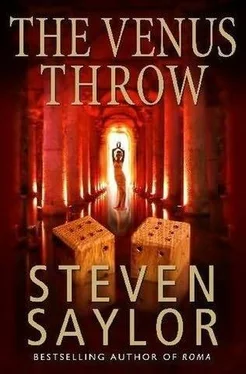Steven Saylor - The Venus Throw
Здесь есть возможность читать онлайн «Steven Saylor - The Venus Throw» весь текст электронной книги совершенно бесплатно (целиком полную версию без сокращений). В некоторых случаях можно слушать аудио, скачать через торрент в формате fb2 и присутствует краткое содержание. Жанр: Исторический детектив, на английском языке. Описание произведения, (предисловие) а так же отзывы посетителей доступны на портале библиотеки ЛибКат.
- Название:The Venus Throw
- Автор:
- Жанр:
- Год:неизвестен
- ISBN:нет данных
- Рейтинг книги:3 / 5. Голосов: 1
-
Избранное:Добавить в избранное
- Отзывы:
-
Ваша оценка:
- 60
- 1
- 2
- 3
- 4
- 5
The Venus Throw: краткое содержание, описание и аннотация
Предлагаем к чтению аннотацию, описание, краткое содержание или предисловие (зависит от того, что написал сам автор книги «The Venus Throw»). Если вы не нашли необходимую информацию о книге — напишите в комментариях, мы постараемся отыскать её.
The Venus Throw — читать онлайн бесплатно полную книгу (весь текст) целиком
Ниже представлен текст книги, разбитый по страницам. Система сохранения места последней прочитанной страницы, позволяет с удобством читать онлайн бесплатно книгу «The Venus Throw», без необходимости каждый раз заново искать на чём Вы остановились. Поставьте закладку, и сможете в любой момент перейти на страницу, на которой закончили чтение.
Интервал:
Закладка:
"Dio told me your husband had a visitor that day."
"Publius Asicius. He's the one who was later accused of stabbing Dio at Coponius's house, though they couldn't prove it at the trial. Yes, he came by to visit Lucius at just about the time Juba must have been sneaking out. But I don't think Asicius delivered the poison, if that's what you think. He didn't go near the kitchen slaves."
"But he could have been here as a distraction, to keep your husband busy while Juba sneaked out of the house to get the poison from someone else."
"What an imagination you have!" she said wryly.
"Where is Juba now? Would you let me speak to him?"
"I would if I could, but he's gone. Juba and Laco are both gone."
"Gone where?"
"After his taster died, Dio was quite upset. He screamed and ranted and demanded that Lucius determine which of the slaves had tried to poison him. I pointed out the suspicious behavior of Juba and Laco, but Lucius wouldn't hear of any suggestion that there was poison involved. Even so, a few days later he decided that Juba and Laco-trained kitchen slaves-would be of more use doing manual labor in a mine. Lucius owns an interest in a silver mine up in Picenum. So off the slaves went, out of reach, out of mind."
She held up the clay figurine of Attis and stroked it with her forefinger. "But this is the most curious fact: when Lucius made his pronouncement about sending Juba and Laco to Picenum, they suddenly offered to buy their freedom. Somehow, from the few coppers Lucius gave them every year to celebrate the Saturnalia, the two ofthem had managed to save up their own worth in silver."
"Was that possible?"
"Absolutely not. Lucius accused them of pilfering from the house-hold coffers."
"Could they have done that?"
"Do you think I'm the sort of woman whose slaves could steal from her?" She gave me a look calculated to make a slave soil himself. "But that was the explanation Lucius decided on, and nothing will ever sway him from it. He took the silver away from them, sent them off to an early death in the mines, and that was the end of it."
"Where do you think the slaves obtained the silver?"
"Don't be coy," she said. "Someone bribed them to poison Dio, of course. Probably they received only partial payment, since they didn't finish the job. If I were the master of this house I'd have tortured them until the truth came out. But the slaves belong to Lucius."
"The slaves know the truth."
"The slaves know something. But they're far away from Rome now." "And they can't be compelled to testify anyway without their master's consent."
"Which Lucius will never give."
"Who gave them the silver?" I muttered.
"How can anyone find
out?"
"I suppose that's your job," she said bluntly. She walked back to the little table and replaced the clay figurine of Attis. I drew alongside her and studied the tiny statues.
"Why so many, all alike?" I asked.
"Because of the Great Mother festival, of course. These are images of Attis, her consort. For gift-giving." "I never heard of such a custom." "We exchange them among ourselves." "'We'?"
"It has nothing to do with you."
I reached to pick up one of the figurines, but she seized my wrist with a startlingly strong grip.
"It has nothing to do with you, I said." After a moment she released me, then clapped her hands. A girl came running. "Now you had better go. The slave will show you out."
Chapter Thirteen
The easiest route to the house of Titus Coponius, where Dio had died, took me back the way I had come. Passing the former residence of Marcus Caelius again, I noticed that the FOR SALE announcement was untouched, but the obscene graffito beneath it had already been daubed over with paint.
Clodius's henchmen could be accused of many things, but not idleness.
Titus Coponius saw me at once, and soon I was seated in his study with a cup of wine in my hand. If the study of Lucius Lucceius was a hoary homage to the conquest of Carthage, the study of Titus Coponius was a tribute to the enduring triumph of Greek culture. Black-on-red drinking cups, too ancient and precious for use, were displayed on shelves. Small statues of the great heroes and busts of the great thinkers were displayed on pedestals against the walls. A pigeonhole scroll case was full of cylindrical leather slipcases, and on the little colored tags hanging from each cylinder I glimpsed the names of the old Greek playwrights and historians. The room itself was impeccably appointed, with high-backed Greek chairs and a Greek carpet with a geometrical design, all harmoniously in proportion to the space they occupied.
Coponius was a tall man with a long rectangular face and a hand-some nose; even seated he had an imposing air. His hair was clipped short and was very curly, black on top but gray on the sides. His clothing and manner were as elegant as the room in which we sat. "I suppose you've come about Dio," he began.
"What makes you think so?"
"Come now, Gordianus. I know you by reputation. I also know that Bestia's son has brought charges against Marcus Caelius for trying to poison Dio, among other things. It hardly takes a philosopher to figure out your reason for coming to the house where Dio died. What I don't know is who sent you-Bestia's boy for the prosecution, or Caelius for his defense."
"Neither, actually."
"Now that's a puzzle."
"Not to everyone, apparently," I said, thinking of Lucceius's wife. "Does it matter who sent me, so long as I seek the truth?"
"Most men have some ulterior motive, even in seeking for truth. Revenge, vindication, power-"
"Justice. For Dio."
Coponius put down his wine cup and folded his long, elegant hands in his lap. "Some day, when we both have a great deal more time, we should discuss that word, 'justice,' and see if we can come up with a mutually acceptable definition. For the short term, I assume you mean you seek the truth in order to identify Dio's killer. A straightforward enough ambition-but I don't think I can help you."
"Why not?"
"I can't tell you what I don't know." "Perhaps you know more than you realize." "A conundrum, Gordianus?" "Life is full of them."
Coponius contemplated me with a catlike gaze. "As I understand it, the charges against Caelius involve attacks on the Egyptian entourage on its way to Rome, and an alleged attempt to poison Dio at Lucceius's house. What happened in this house isn't even cited in the formal list of charges."
"Technically, it is. But the prosecution intends to concentrate on the attempted poisoning, and use the actual murder of Dio as a corroborative detail."
"Then you do come from the prosecution." Coponius gave me a brittle smile. "Don't misunderstand. I don't mind you coming around asking questions. I went through all this before, when Asicius was pros-ecuted. I shared all I know with both sides, and in the end I helped neither. The simple fact is that the killers left nothing behind to give themselves away. Asicius was prosecuted on hearsay, not evidence. Yes, 'everyone knows' that he was somehow involved, just as 'everyone knows' that King Ptolemy must be at the back of it, but the proof was never put forward, and you won't find it in this house."
"Still, I should like to know what happened here."
Coponius took a sip of wine and turned his catlike gaze on me again. "I knew Dio in Alexandria," he finally said. "A few years ago, my brother and I spent some time there. Gaius, always the practical one, was interested in studying the financial workings of the grain markets. I found myself drawn instead to the steps of the library at the Temple of Serapis, where philosophers discussed the very things we're talking about-truth, justice, conundrums. That was how I met Dio."
"That was how I met him as well," I said.
Читать дальшеИнтервал:
Закладка:
Похожие книги на «The Venus Throw»
Представляем Вашему вниманию похожие книги на «The Venus Throw» списком для выбора. Мы отобрали схожую по названию и смыслу литературу в надежде предоставить читателям больше вариантов отыскать новые, интересные, ещё непрочитанные произведения.
Обсуждение, отзывы о книге «The Venus Throw» и просто собственные мнения читателей. Оставьте ваши комментарии, напишите, что Вы думаете о произведении, его смысле или главных героях. Укажите что конкретно понравилось, а что нет, и почему Вы так считаете.










